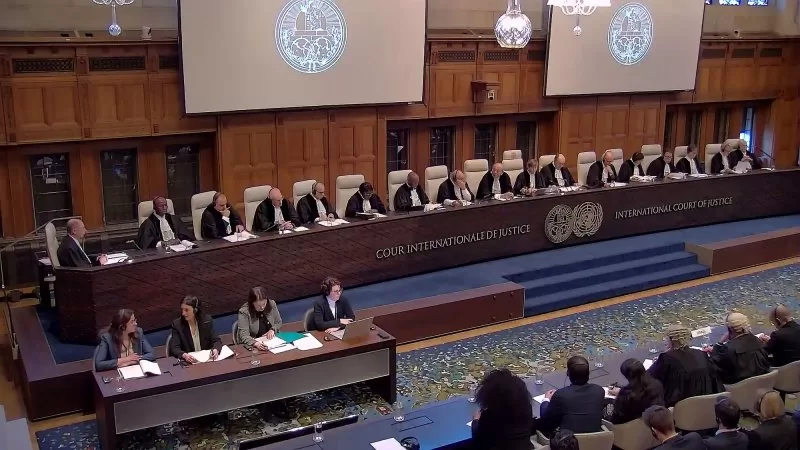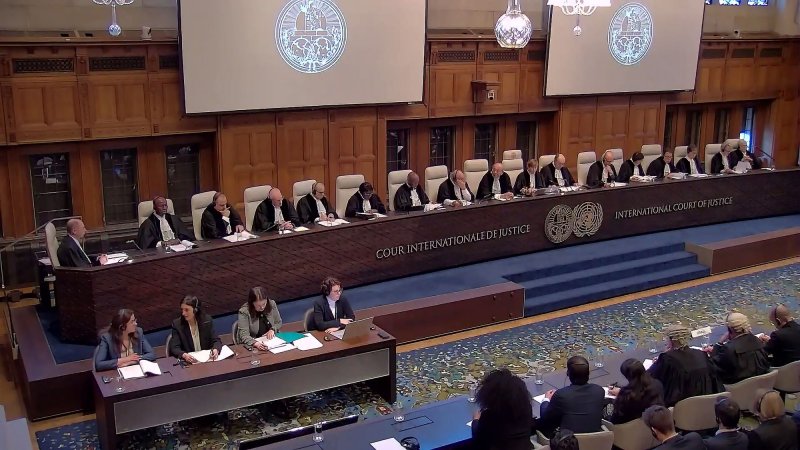The International Court of Justice on Monday began two days of hearings on allegations that Germany is aiding Israel with committing genocide in Gaza. File Photo by International justice of Court/UPI |
License PhotoApril 8 (UPI) — The International Court of Justice on Monday kicked off two days of hearings in the Hague over allegations that Germany is aiding genocide perpetrated by Israel in Gaza.
Nicaragua last month initiated the proceedings by accusing Germany of “facilitating the commission of genocide and, in any case has failed in its obligation to do everything possible to prevent the commission of genocide.”
Germany is an important weapons dealer for Israel, while Nicaragua has been a supporter of the Palestinian State.
Nicaraguan Ambassador to the Netherlands Carlos Jose Arguello Gomez was the first to speak before the 15-judge tribunal on Monday.
He described the Palestinian enclave of Gaza as the site where serious crimes against international law, including genocide, were taking place openly, in front of thousands of witnesses on the ground and potentially the majority of the planet in news and social media.
He continued that all states have a responsibility to not abet the perpetrator but also to put forth efforts to prevent breaches of international law.
“With respect to these obligations, there are no third states,” he said. “Germany has violated these obligations imposed on all states.”
Nicaragua, he said, is requesting that the court order Germany to cease providing support to Israel “in its campaign of destruction of the Palestinian people.”
He said the request is not only on behalf of Nicaragua’s support of international law, but on behalf of the Palestinians who are being subjected to “one of the most destructive military actions in modern history.”
His country, he continued, has a “special sympathy” for the Palestinians over their shared history of International military intervention.
He also refuted Germany’s argument that its support for Israel comes from its historical treatment of Jews under Nazi rule by saying that would be a laudable policy if it were addressed to the Jewish people.
“The Israeli state, in particular this present government, should not be confused and equated with the Jewish people,” he said.
“The real friends of the Jewish people should emphasize the difference. The Jewish victims in the concentration camps during the Second World War would feel sympathy and empathize with the 30,000 civilians, including 25,000 mothers and children, being massacred so far in Palestine.”
Gomez spoke to the court a day after Israel’s war against Iran-backed Hamas in Gaza hit the grim six-month mark, during which more than 33,000 Palestinians were killed, mostly women and children, with another nearly 76,000 injured.
Germany said in a statement Monday that it supports international law and the International Court of Justice, which is why it rejects Nicaragua’s allegations.
“We will present our legal opinion to the #ICJ on Tuesday,” it said in a statement on X. “Today, we will follow Nicaragua’s presentation closely. Our team for international law @GermanyOnIntLaw will refute the expected allegations in detail tomorrow, accusation by accusation.”
The war has razed the enclaved of Gaza, damaging or destroying some 62% of all homes and 84% of all health facilities, according to a recent update from the U.N. relief agency for Palestinian refugees. As of April 1, as many as 1.7 million people, more than 75% of the enclave’s population, have been displaced, it said.
Israel is also facing two cases this year before the World Court over its treatment of Palestinians, one filed by South Africa over the Middle Eastern country’s war and the other brought by a United Nations General Assembly resolution adopted in late 2022.
The South African case resulted in a late January ruling that ordered Israel to take immediate steps to end atrocities being committed in Gaza. South Africa has since asked for further provisions to be added to that order in light of the looming famine in Gaza.
The U.N.-connected hearings were heard over six days in February and involved an unprecedented more than 50 countries participating.

